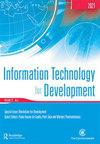Frugal innovation and digital effectuation for development: the case of Lucia
IF 5.1
3区 管理学
Q1 DEVELOPMENT STUDIES
引用次数: 5
Abstract
ABSTRACT This paper illustrates how the lens of effectuation and frugal innovation can be employed to understand digital entrepreneurial practices in development contexts. It presents the case of the director Pawan Kumar, who produced the movie Lucia by relying upon digital tools to create a project identity, to access resources and knowledge from his network, to experiment with variations of his business idea, as well as to secure commitment from partners on a scale that would be impossible otherwise. Using this empirical setting, the paper analyses the practices employed by entrepreneurs in development contexts to overcome resource limitations and institutional voids by leveraging digital technologies to pursue opportunities. The case contributes to the literature on ICT4D by illustrating how digital entrepreneurship has the potential not only to bring about economic benefits, but also to stimulate local culture production, an impact of digital entrepreneurship often overlooked in the literature.节约型创新和数字化实现发展:以露西亚为例
摘要本文阐述了如何利用有效性和节俭创新的视角来理解发展背景下的数字创业实践。它介绍了导演帕万·库马尔的案例,他制作电影《露西亚》时依靠数字工具来创建项目身份,从他的网络中获取资源和知识,尝试他的商业理念的变化,并确保合作伙伴做出规模不可能的承诺。利用这一经验背景,本文分析了企业家在发展背景下通过利用数字技术寻找机会来克服资源限制和制度空白的做法。该案例通过说明数字创业如何不仅有潜力带来经济效益,而且有潜力刺激当地文化生产,为ICT4D的文献做出了贡献,而数字创业的影响在文献中经常被忽视。
本文章由计算机程序翻译,如有差异,请以英文原文为准。
求助全文
约1分钟内获得全文
求助全文
来源期刊

Information Technology for Development
Multiple-
CiteScore
11.30
自引率
16.70%
发文量
34
期刊介绍:
Information Technology for Development , with an established record for publishing quality research and influencing practice, is the first journal to have explicitly addressed global information technology issues and opportunities. It publishes social and technical research on the effects of Information Technology (IT) on economic, social and human development. The objective of the Journal is to provide a forum for policy-makers, practitioners, and academics to discuss strategies and best practices, tools and techniques for ascertaining the effects of IT infrastructures in government, civil societies and the private sector, and theories and frameworks that explain the effects of IT on development. The concept of development relates to social, economic and human outcomes from the implementation of Information and Communication Technology (ICT) tools, technologies, and infrastructures. In addition to being a valuable publication in the field of information systems, Information Technology for Development is also cited in fields such as public administration, economics, and international development and business, and has a particularly large readership in international agencies connected to the Commonwealth Secretariat, United Nations, and World Bank.
 求助内容:
求助内容: 应助结果提醒方式:
应助结果提醒方式:


